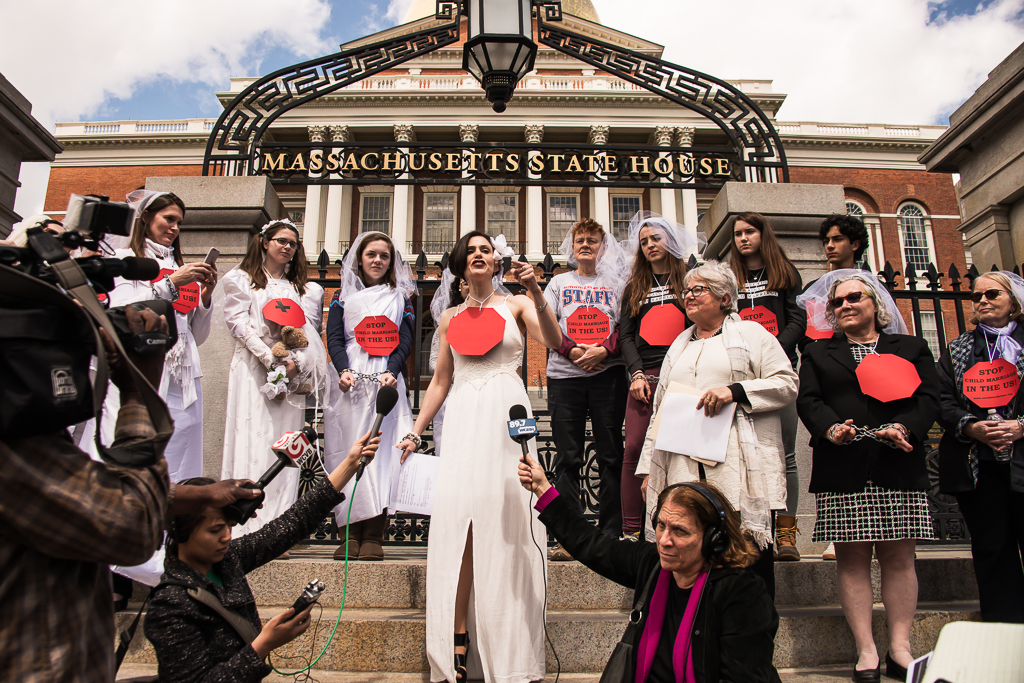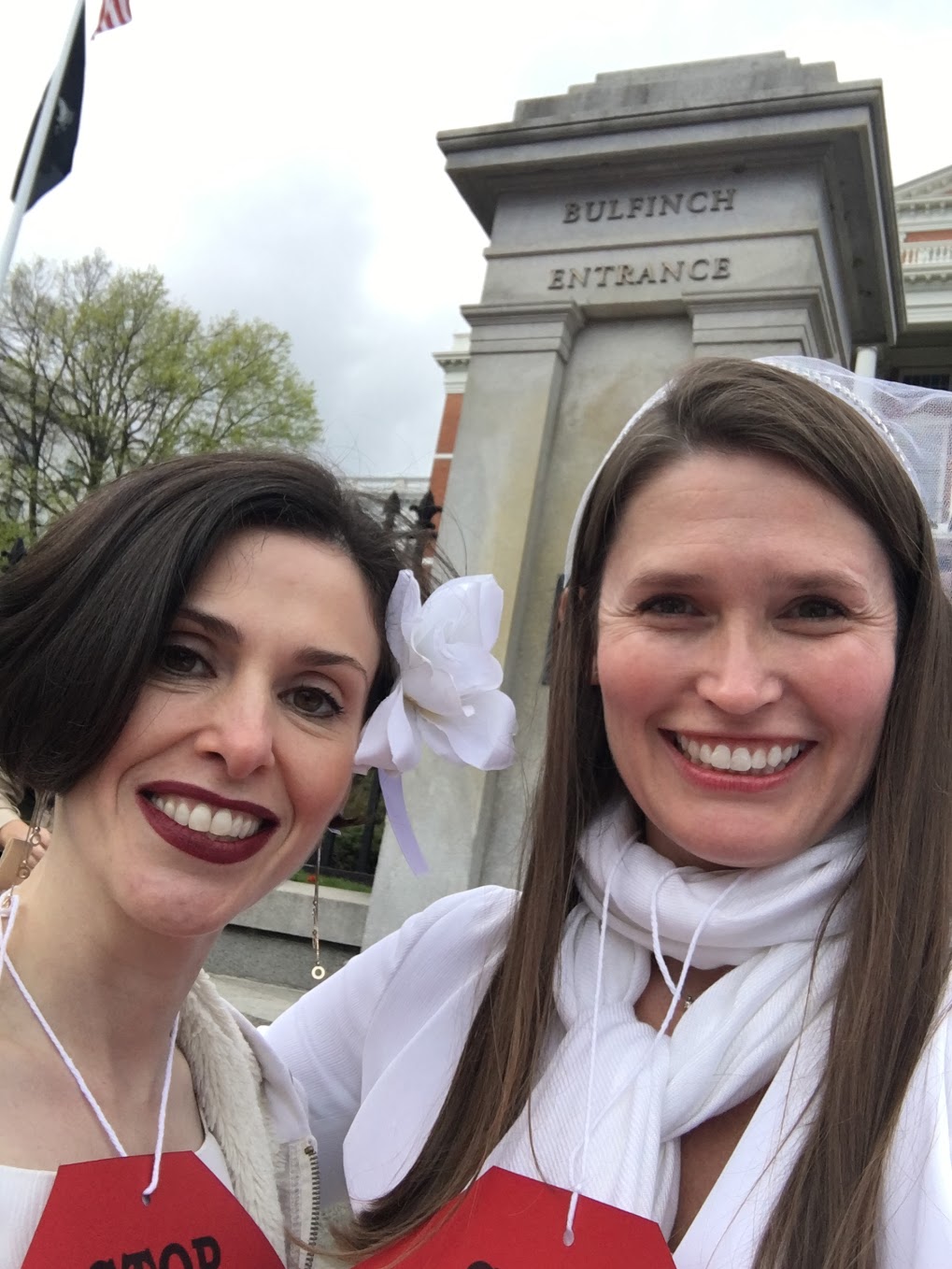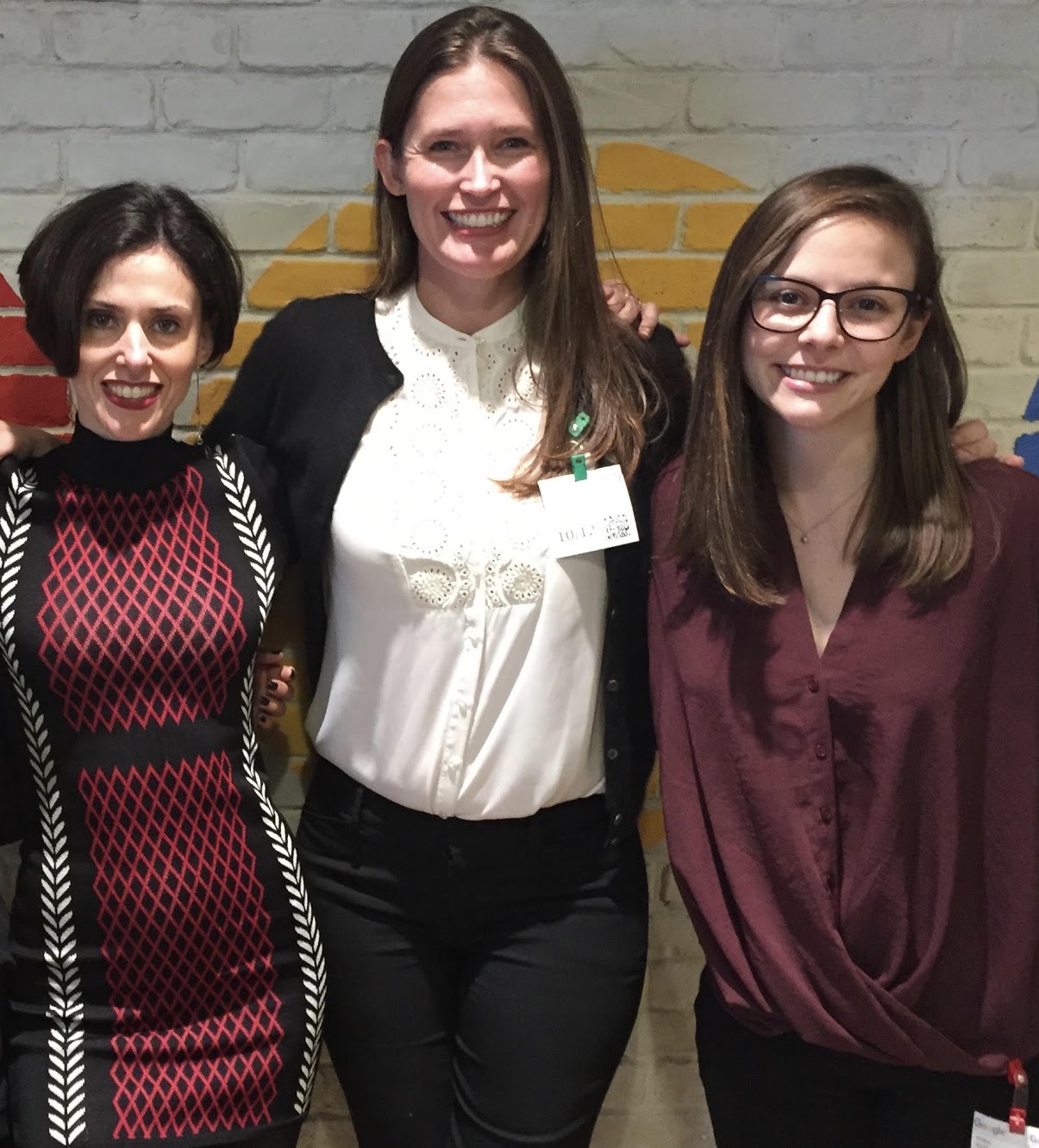Survivor of a Forced Marriage, Fraidy Reiss, Works to End Child Marriage in America’s Neighborhoods

Fraidy Reiss is the Founder and Executive Director of Unchained At Last, the AHA Foundation’s sister organization that works to end child marriage in the United States. She herself is a survivor of a forced marriage, in which she was trapped for 15 years. After escaping this marriage, she dedicated her life to advocating for women and girls, so that no one else has to live through what she did.
Fraidy is not only a close ally of the work that we do, but also a great friend to us at the AHA Foundation. We are so happy to share her story and the great work that Unchained At Last is doing and look forward to further collaborations in the future.
To watch Fraidy’s full interview, click here.
AHA Foundation: Tell us a little about your story and what inspired you to found Unchained At Last.

Fraidy Reiss: I founded Unchained At Last out of my own traumatic experience. I was raised in an insular religious community in Brooklyn that regularly practices arranged and forced marriage and child marriage. My family arranged my marriage when I was 19 to a guy who turned out to be violent and then I was trapped in that marriage for 15 years. When I finally managed to escape, my family shunned me. They still consider me dead.
So I founded Unchained At Last as a way to help other women and girls who are either trying to say “no” to a forced marriage and their parents aren’t listening, or are already in a marriage like that and are trying to get out.
AHA Foundation: How common is child marriage and forced marriage in the U.S.?
Fraidy Reiss: We really don’t know how common forced marriage is in the United States because so little research has been done on this. America is just ignoring that this is happening, very little research has been done. We don’t know the extent of the forced marriage problem in America.
For a long time, no one even knew how often child marriage was happening. We at Unchained At Last changed that last year. We did this groundbreaking research project. It took us a full year. We went to all 50 states and we asked for their marriage license data, specifically the ages on their marriage license applications. We were able to get the data from 38 states for the full period of 2000-2010 and in just those 38 states, in just that one decade, more than 167,000 children as young as 10 were married, almost all of them were girls married to adult men.
Then based on that, we estimate that in all 50 states in that decade, nearly a quarter of a million children were married in America.
People can’t still keep ignoring this and insisting that it happens elsewhere; the numbers prove that this is a significant, widespread gender-violence problem in America.
“We estimate that in all 50 states in that decade, nearly a quarter of a million children were married in America.”
AHA Foundation: What is a “chain-in” and why do you hold them?
Fraidy Reiss: We invented a unique form of peaceful protest as a way to raise awareness about forced and child marriage in America. What we do at a Chain-In is we gather as many people as possible, and we all wear bridal gowns and veils. Unchained provides the bridal gowns and the veils, and then we chain our wrists and tape our mouths, and Unchained provides safe, plastic chains that look like real chains and the tape.
“She is trapped, and she is silenced.”
When you have a group of people standing there wearing bridal gowns and dressed like brides but their wrists are chained and their mouths are taped, it sends a very strong message: this is what life looks like for a girl that is forced to marry or a woman who is forced to marry. She is trapped, and she is silent.
We have done seven Chain-Ins so far in three states. It is incredibly empowering to be chained up in this way, as a way to send a powerful message, and it is something that people can’t ignore. We do this in as public a place as possible, either in front of a statehouse or in a busy place. So there are people walking by saying, “Woah, what’s going on? Who are all those chained brides?” It makes a splash, and we also get a lot of media attention and it helps us spread the word.
This is happening and it is happening right here in America. We aren’t trying to end child marriage in a developing country on the other side of the world. We are trying to end child marriage in your neighborhood.

Photo by Susan Landmann
AHA Foundation: Why is it so difficult to get child marriage legislation passed in the U.S.?
Fraidy Reiss: When I first started doing this, I thought, “you know, legislators just don’t know that child marriage is legal in their state,” because right now marriage before 18 is legal in all 50 states. Then I thought, “well as soon as I point this out, they are going to jump up, give me a big hug, and run to write a bill to end this and to solve this problem. I’ve been really shocked that two years later, not a single state has passed the very simple, common-sense legislation that I’ve helped to write, which just eliminates the loopholes that existing state laws in every state, which allow marriage before 18. Marriage is a serious legal contract that should be reserved for adults; those that are 18 or in some states the age of majority or adulthood is higher and marriage should be higher in those states.
And yet, the pushback we’ve gotten has really come up from a lot of ignorance and in some cases sexism. A lot of legislators just don’t understand that child marriage is not a beautiful, romantic thing. Marriage between two consenting adults can be beautiful, and it is a civil liberty.
Marriage involving a child is a human rights abuse according to the U.S. State Department. It has devastating repercussions on the girls; its destroys their health, their education, their economic opportunity, their overall quality of life. And also we know that often times child marriage is forced marriage because children, who have not yet become adults, have such a hard time trying to escape from a forced marriage before or after its happened.
“Marriage involving a child is a human rights abuse according to the U.S. State Department.”
This is not a beautiful, romantic thing; it is a human rights abuse, and it is upsetting to me that legislators, who maybe didn’t know about it before I came along, but now that we are explaining to them, we have Unchained At Last, AHA Foundation, and other allies are coming together and explaining to them that this is a serious human rights abuse and you need to end this, and there has been resistance from legislators who just won’t accept that marriage can be anything but a beautiful, happy, romantic thing.
But, I think that part of it is also sexism. You would not believe how many legislators have said to me, “if a girl gets pregnant, she’s gotta get married.” And they don’t care if she was raped. If she is pregnant before the age of consent, there is only one way that could have happened. She cannot consent to have sex, then she was raped. Even if she is above the age of consent to have sex, the notion that every girl that is pregnant needs to get married is outdated and sexist. It completely ignores the value of the girl as a human being beyond her womb. In many cases, even above the age of consent, that pregnancy exceptions cover up rape and force girls to marry their own rapist. Studies show that a pregnant teenage girl that remains single has better outcomes than a pregnant teenage girl that marries. These legislators are not helping pregnant teenage girls by insisting they get married.
AHA Foundation: Why should states set 18 as the minimum age of marriage with no exceptions?
Fraidy Reiss: There are probably a hundred reasons to end marriage before age 18, but let’s stick to the two most compelling ones, and the two most important ones. The reasons that I have become so passionate about ending child marriage in America, or marriage before age 18.
“You would not believe how many legislators have said to me, ‘if a girl gets pregnant, she’s gotta get married.'”
The first is marriage before 18 often is forced marriage. It can very easily be forced marriage because before a child obtains the rights of adulthood, which usually happens at 18 or in a couple of states it’s higher, that child cannot take basic steps from preventing a forced marriage from happening or to get out of an unhappy marriage once it has already happened.
In terms of leaving home, a child who leaves home is considered a runaway. If we help at Unchained At Last, the way we do for someone who is 18 or older, we can be charged criminally. That actually happened in one of the cases that we worked on where one of our volunteers was charged criminally for helping a girl to escape. Even if we manage to get these girls to a shelter without being charged criminally, shelters will almost never take in girls before their 18th birthday because they face all kinds of potential liability issues.
“In a lot of states now in the U.S., a child is allowed to marry but not allowed to file for a divorce.”
And then contracts with children usually are voidable – that means that a retainer agreement between a child and an attorney is voidable. Which attorney is going to take on a child as a client? And then we have this really shocking fact that children usually are not allowed to bring legal action in their own name. And that means that in a lot of states now in the U.S., a child is allowed to marry but not allowed to file for a divorce.
And in those states, in many cases, a child can file for divorce if her parent brings the action for her; so just to think about the absurdity of that situation – I call it absurd, but it’s really just evil – her parents are probably the ones who forced her into a marriage because we know that when a child is forced to marry, the perpetrators are almost always the parents. So now this girl, whose parents forced her to marry has to go say, “Hey mom and dad, can you file this divorce for me?” How is that possibly supposed to happen? And how could anybody ever be okay with this notion of children being allowed to marry before they’re even allowed to divorce? That can’t possibly be okay.
The second really important reason to end marriage before age 18 is the devastating repercussions of marriage at that age, where we know that it destroys a girl’s health, education, and economic opportunities, and significantly increases her risk of experiencing violence.
One of the common loopholes that we see across the United States that allows marriage before age 18 is the parental consent exception. In many states, the marriage age is 18, but children age 16 or 17 can marry with parental consent. In other states, when other criteria are met, the marriage age is lowered even more. In fact, in 25 states, there is no minimum age at all specified in the law with all the exceptions. In other states, when other criteria are met, the marriage age is lowered even more.
The problem with the parental consent exception is that we know that when a child is forced to marry, the perpetrators are almost always the parents. We know that parental consent is in many cases parental coercion. In fact, I know survivors who were sobbing openly when their parents took them to the clerk’s office and signed the marriage license under this parental consent exception and forced them to marry, and the clerk either didn’t even look up, or in one case, said to the girl, “Why are you crying? This should be the happiest day of your life.”
“It destroys a girl’s health, education, and economic opportunities, and significantly increases her risk of experiencing violence.”
Clerks in many states have said, “We are very uncomfortable with this. They are clearly girls who are being dragged in here against their will and being forced to marry.” There’s nothing that a clerk is even allowed to do in that situation to intervene. The clerk has no authority to say, “No, I’m not approving this marriage – this girl is sobbing and begging me for help.” By allowing the parents who are the ones who are forcing their children into marriage to marry off their kids with just a signature is like saying, “Well, you can kidnap this child only if you kidnap the child.” That’s not a protection to anybody. It’s a farce.
AHA Foundation:The AHA Foundation and Unchained At Last are sister organizations. Can you tell our readers about some of our collaborations?

AHA Senior Director Amanda Parker and Fraidy Reiss at a Chain-In in Boston
Fraidy Reiss: We at Unchained At Last started this national movement to end child marriage in state after state, but obviously this is not something that we can take on our own, especially since we are a tiny little organization based in a tiny little office in an undisclosed location in New Jersey. We’ve been really fortunate to have allies like the AHA Foundation step up and say, “We agree: child marriage needs to stop and we will do whatever it takes to end this human rights abuse.”
AHA Foundation has been there at Unchained’s side in many states, testifying at legislative hearings, speaking to legislators, and even being part of our “chain-ins.” I can’t tell you how many times we’ve had Amanda Parker from AHA Foundation chained up at a chain-in. She has flown around the country to be at these hearings and events, and we are so grateful to have AHA’s partnership on this. Of course, Unchained and AHA’s partnership goes beyond just this legislative push to end child marriage. We have partnered on other projects as well, and other missions, some of which are still in the works.
AHA Foundation was the one that pointed out that right now there is no minimum age in the United States to petition for a foreign spouse. That is a significant loophole under which many children are forced to marry for immigration purposes. That was something that we at Unchained didn’t realize until AHA Foundation pointed that out, and now we can work for a federal legislative fix.
AHA Foundation: What does 2018 look like for Unchained At Last? What are some of your upcoming events and legislative focuses?
Fraidy Reiss: 2018 has already just been a crazy year – crazy in a good way. What’s happening is that we’re getting real momentum in this national push to end child marriage. Many, many states, all at the same time, are saying, “Yes, let’s do this,” and they’re all introducing bills at the same time. That’s a very happy update, but it’s also just very overwhelming because we are a tiny organization, a tiny team, and we’re trying to manage all of this.
In states where the legislation that is introduced is good, strong legislation that would actually end child marriage, not just limit it or reduce it or end one loophole and start a new one, we want to get those bills to pass. In states where the legislation that is introduced is not quite there, we want to get it amended and passed. In states where the legislation is “What, that’s actually worse than what you already have,” which actually happened in New Hampshire, we’re working to kill those bills. It’s kind of overwhelming.
“What’s happening is that we’re getting real momentum in this national push to end child marriage. Many, many states, all at the same time, are saying, “Yes, let’s do this,” and they’re all introducing bills at the same time.”
We are working right now with strong legislation pending in 6 states, and we are working to get all those passed. Then there’s a lot of other bills pending in other states that we’re working to tweak, fix, amend. There are a couple of states where we’re working to kill the bills, and then other states that are about to introduce legislation. Really the list doesn’t stop.
Then, of course, there’s the federal level; we have to pass legislation at the federal level as well to end that loophole that allows children of any age to petition for a foreign spouse or to be the beneficiary of a spousal fiance visa.
2018 is an exciting year for us. We actually do have some exciting things we’re not allowed to announce yet that are in the works that are going to be happening in April and in May.
 AHA Foundation: What are best ways for supporters to raise awareness about child and forced marriage in the U.S. and fight to stop it?
AHA Foundation: What are best ways for supporters to raise awareness about child and forced marriage in the U.S. and fight to stop it?
Fraidy Reiss: You can submit an email to your legislators and your governors, saying “yes, vote yes for ending child marriage.” You can do this on AHA Foundation website here or Unchained At Last organization website here. If you’re in a state where legislation has been introduced to end child marriage, it takes 3 minutes or less to complete the email.
Join an upcoming chain-in. If you join our mailing list, we’ll let you know when our next chain-in is, and if it’s in your state, or somewhere that you can easily get to, I hope you’ll join us at a chain-in.
Just talk about us, follow us on social media, follow AHA Foundation on social media, be a part of the conversation. Bring it up at dinner tonight. Tell people, “You wouldn’t believe what I learned today. Child marriage and forced marriage are happening in America, and we need to stop it.”
The opinions stated above are those of Fraidy Reiss and do not necessarily represent the views of the AHA Foundation.

